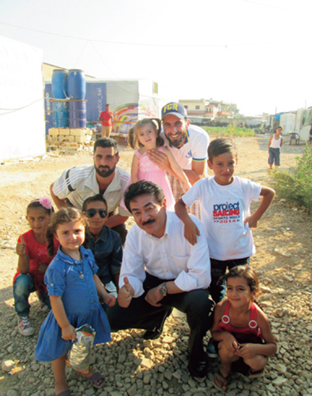Chapter 3 Promotion of the Humanitarian, Development and Peace Nexus
In recent years, the humanitarian crises occurring in various parts of the world have become increasingly prolonged and complex. As of 2017, the number of people who have been forced to evacuate, including refugees, has hit a record high since World War II, and is continuing to rise. In particular, after the summer of 2015, the mass influx of refugees and migrants from the Middle East and Africa to Europe has come under the spotlight, making the refugee crisis one of the most pressing issues that the international community has to address in earnest.
Section 1 Humanitarian Assistance for Prolonged and Complex Humanitarian Crises

In September 2017, State Minister for Foreign Affairs Masahisa Sato visited an unofficial refugee residential area in Taanayel, Lebanon, and spoke to a family of Syrian refugees.
In cases where a country is exposed to the threat of a humanitarian crisis that gives rise to refugees or internally displaced persons (IDPs), the first thing that has to be done is to offer humanitarian assistance by providing emergency shelter (simple tents), water, food, medical aid, etc.
However, it is important to have a medium- to long-term perspective which recognizes refugees and IDPs not only as subjects for protection, but rather as a group of people who will become self-reliant in the future and take on the responsibility of rebuilding their home countries. From this perspective, Japan places strong emphasis on engaging in “development cooperation” for refugees and IDPs from the initial phases of the humanitarian crisis, alongside with offering humanitarian assistance. In doing so, the two points listed below are particularly important.
(i) Support to refugees and IDPs to improve their independence and livelihoods
For instance, providing education to children, who play a key role in building the country in the future, is essential in the earliest stage of evacuation, and it is vital to ensure that there are no periods of disruption to their education. Education and vocational trainings will contribute to accelerating the return of refugees and IDPs in the future, as well as their reintegration into society after their return.
(ii) Support for basic infrastructure (such as water supply, health and medical care, waste management, roads, etc.) for both refugees/IDPs and host communities, and support to improve administrative capabilities (particularly of local governments) for its management and operations
As a result of the mass influx of refugees and IDPs and the prolonged evacuation, social tensions between refugees and the host communities tend to arise frequently. However, ensuring that refugees and IDPs as well as host communities are able to gain access to the health and medical facilities provided through Japan's support, for example, could lead to daily interaction between the two parties and contribute to easing of tensions between them.
Japan is actively promoting the approach of “humanitarian-development nexus,” a concept that is also crucial from the perspective of preventing refugees and IDPs from falling once again into a situation where they require humanitarian assistance. Traditionally, support to refugees and host countries has been led by international organizations. In recent years, Japan is also exploring the possibility of expanding bilateral cooperation into assistance to refugees and host countries by taking a full advantage of the friendly relations that Japan has built up with its partner countries to date.
